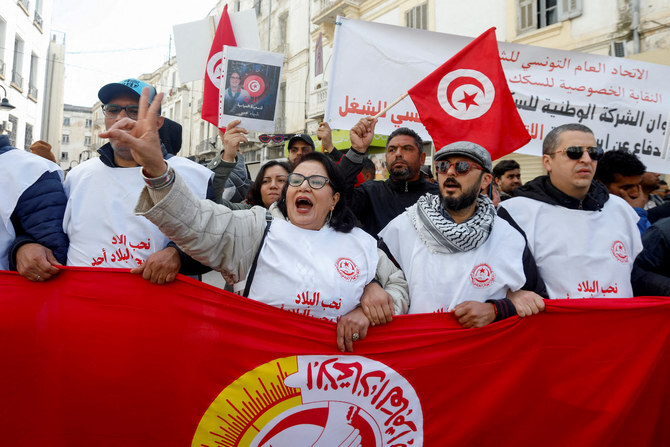TUNIS: Tunisia has said it is withdrawing from the human rights court of the African Union, as rights groups denounce another rollback on freedoms in the increasingly authoritarian North African nation.
Tunisia announced in a declaration circulated by activists since Thursday “the withdrawal of its recognition of the competence of the (African Court on Human and Peoples’ Rights) to accept cases from individuals and non-governmental organizations.”
The statement did not provide a reason for the government’s withdrawal from the Arusha-based court, which is tasked with enforcing the AU’s human rights charter.
The Tunisian foreign ministry did not respond to AFP’s requests to comment.
Tunisia had granted its citizens and NGOs the right to petition the court in 2017 after it emerged as the only surviving democracy from the Arab Spring of 2011.
Kais Saied was elected president in 2019 but in 2021 he staged a sweeping power grab and human rights groups have since raised concerns over a rollback on freedoms.
A number of his leading critics are currently behind bars.
Some are being prosecuted in an ongoing mass trial on charges of plotting against the state. Human rights groups have denounced the case as politically motivated.
In May 2023, the relatives of four detained opposition figures, including Ennahdha party leader Rached Ghannouchi, filed a case with the African court demanding their release.
In August, the court ruled against Tunisia, urging authorities to stop preventing the detainees from accessing their lawyers and doctors.
The Tunisian League for Human Rights (LTDH) denounced Tunisia’s withdrawal from the court as a decision “taken secretly.”
It said the move was “a dangerous step backwards and an attempt to withdraw from independent judicial institutions capable of fighting impunity and guaranteeing justice.”
Tunisian human rights group, the CRLDHT, said the withdrawal “nullifies a historic commitment” to the court and was “a shameful renunciation” of Tunisian pledges to protect human rights.
“This decision now deprives Tunisian citizens and human rights organizations of the ability to bring cases directly before the African court to challenge state violations,” it said.


Tunisia quits African Union rights court
Short Url
https://arab.news/z7269
Tunisia quits African Union rights court

- The statement did not provide a reason for the government’s withdrawal from the Arusha-based court
- The Tunisian League for Human Rights (LTDH) denounced Tunisia’s withdrawal from the court as a decision “taken secretly“
Israel says it ‘will enforce’ ban on 37 NGOs in Gaza

- Israel said on Thursday that 37 international NGOs operating in Gaza had not complied with a deadline to meet “security and transparency standards,“
JERUSALEM: Israel said on Thursday that 37 international NGOs operating in Gaza had not complied with a deadline to meet “security and transparency standards,” in particular disclosing information on their Palestinian staff, and that it “will enforce” a ban on their activities.
“Organizations that have failed to meet required security and transparency standards will have their licenses suspended,” said spokesman for the Ministry of Diaspora Affairs and Combating Antisemitism, Gilad Zwick.
In March, Israel gave a ten-month deadline to NGOs to comply with the new rules, which expired on Wednesday night. The UN has warned that the ban will exacerbate the humanitarian situation in Gaza.
“Organizations that have failed to meet required security and transparency standards will have their licenses suspended,” said spokesman for the Ministry of Diaspora Affairs and Combating Antisemitism, Gilad Zwick.
In March, Israel gave a ten-month deadline to NGOs to comply with the new rules, which expired on Wednesday night. The UN has warned that the ban will exacerbate the humanitarian situation in Gaza.
© 2026 SAUDI RESEARCH & PUBLISHING COMPANY, All Rights Reserved And subject to Terms of Use Agreement.












